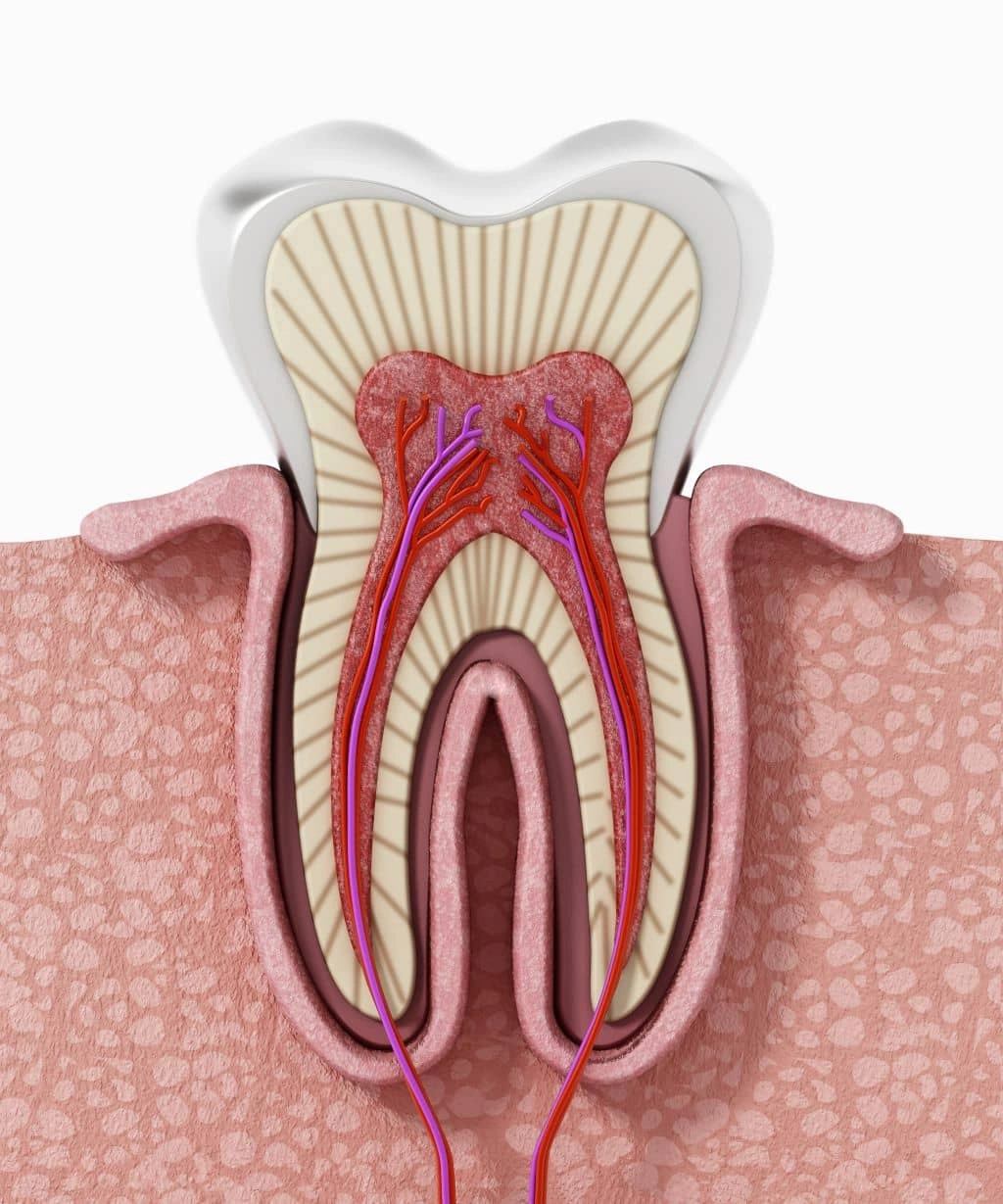Root Canal Treatment Near You
The pulp is the delicate core of a tooth, where nerves and vessels meet to deliver nutrients and blood needed to keep it alive and functioning. Severe tooth damage or infection can disrupt the pulp, leading to unpleasant symptoms like pain, sensitivity, and difficulty eating. To effectively address this issue, the pulp needs to be removed. If left untreated, you may need to extract the entire tooth.
Book a consultation with one of our dentists near you to find out if root canal therapy is right for you.

Visiting Lincoln Dental for Treatment
At our dental practice, our team will do everything to alleviate your discomfort and restore, not only your tooth, but your overall smile. The following steps will occur when you visit us for pulp treatment:
- Consultation. One of our dentists will need to take x-rays of and inspect your tooth to understand the extent of your situation.
- Anesthesia. Medicine that keeps you from feeling pain and numbs your tooth is provided.
- Pulp Removal. A dental drill allows us to access the middle of the tooth. Then, the pulp is removed, and the space is disinfected so an infection doesn’t develop afterward.
- Shaping. The chamber is reshaped before gutta-percha is used to seal it shut. This material is biocompatible and helps preserve the tooth’s structure.
- Restoration. A customized dental crown is provided to cover the treated tooth. However, this can take 1-2 weeks to create, so you’ll be given a temporary one first. Dental crowns are often made from porcelain because this material looks natural, and most people prefer this.
- Final Touches. Once everything is done, we’ll check to ensure no further adjustments are needed. If so, they’ll be made before you leave the clinic.
Let one of our dentists in Coquitlam, BC, know if you have inquiries or concerns about your treatment so we can address them right away. We want you to have a positive experience with us, regardless of why you come in.
Does My Tooth Need Special Care After?
No! After your procedure is done, you can treat your restored tooth like any other. However, remember that sticking to a daily hygiene regimen, being mindful of what you eat, and staying in communication with your dentist via routine cleanings and check-ups will help you avoid the need for future procedures.
Contact Lincoln Dental
If the time has come to schedule root canal treatment near you, the team at Lincoln Dental awaits your call! Every patient deserves to live pain-free and enjoy their smiles, whether that’s treating yourself to a delicious meal or laughing comfortably with friends.
Call, drop by, or send an email to [email protected] to get started. We are here for you!
FAQ's
1. How many visits are required for a root canal treatment?
A root canal will take anywhere from one to two visits, depending on the level of infection. There are some instances involving extra visits for medication and sanitizing. Your dentist will figure out what would be most suitable for your operation.
2. What happens if I delay getting a root canal?
Delaying to a root canal may lead to the infection spreading, which in turn could cause you to feel awful and ultimately lose that tooth. The infection can progress to the jawbone and can even get into the bloodstream, which may lead to more severe health problems. A cure right after you have detected it is the best way to go.
3. Does insurance cover root canal treatments?
Most dental insurance policies cover part or all of the cost for a root canal. Your plan will dictate the coverage, so it is best to ask your provider. Some policies may also cover the crown that is put on after the procedure.
4. Is it necessary to place a crown after a root canal?
A crown is usually recommended after a root canal to protect the tooth structure and to restore its function. Without a crown, root canal treated teeth become increasingly weak and may chip off. Your dentist will advise you on the need for a crown depending on the condition of your tooth.
5. What are the alternatives to a root canal?
The main alternative to a root canal is tooth extraction, though if the tooth is extracted, a bridge, implant or denture may be needed to replace the missing tooth. Pulp capping might be an option for some cases if the damage is not severe. But keeping the natural tooth is generally the best choice.
6. How can I prevent needing a root canal in the future?
Avoiding sugary foods, wearing a mouthguard during sports, and treating cavities early can also help to prevent decay, along with good oral hygiene practices of brushing, flossing and seeing the dentist regularly. It can also help to reduce risk, such as by preventing problems before they get worse, detecting them during routine check-ups.